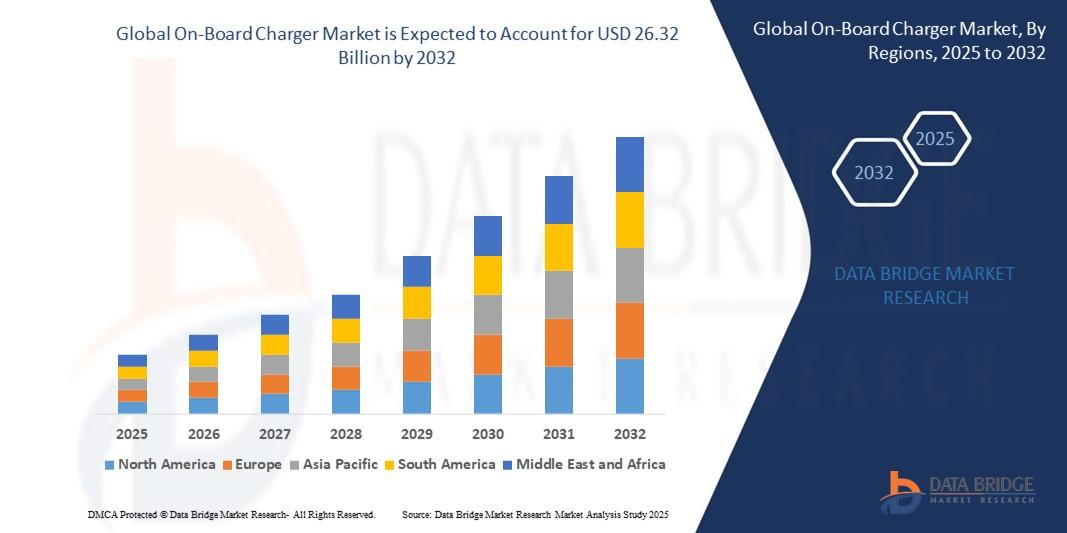"Regional Overview of Executive Summary On-Board Charger Market by Size and Share
- The global on-board charger market size was valued at USD 7.39 billion in 2024 and is expected to reach USD 26.32 billion by 2032, at a CAGR of 17.20% during the forecast period
A consistent market research report like On-Board Charger Market report extends reach to the success in the business. This market research report takes into account plentiful aspects of the market analysis which many businesses demand. The winning market analysis report displays a professional and all-inclusive study of the On-Board Charger Market industry which focuses on primary and secondary drivers, market share, competitor analysis, leading segments and geographical analysis. Adopting such wide ranging On-Board Charger Market report has become the obligation of this rapidly changing market place as it makes attentive about the market conditions around.
The market analysis of On-Board Charger Market research report provides an examination of various market segments that are supposed to witness the fastest development amid the estimated forecast frame. The comprehensive market research has been conducted in this report which puts a light on the challenges, market structures, opportunities, driving forces, scope, and competitive landscape for the business. The best tools have been adopted to generate this report which is SWOT analysis and Porter’s Five Forces analysis. This market report is truly a key to achieve the new horizon of success. On-Board Charger Market is a professional and exhaustive report which focuses on primary and secondary drivers, market share, leading segments and geographical analysis.
Learn how the On-Board Charger Market is evolving—insights, trends, and opportunities await. Download report:
https://www.databridgemarketresearch.com/reports/global-on-board-charger-market
On-Board Charger Market Introduction
Segments
- Vehicle Type: The on-board charger market can be segmented based on vehicle type into electric cars, plug-in hybrid electric vehicles (PHEVs), and hybrid electric vehicles (HEVs). Electric cars have gained significant popularity due to increasing environmental concerns and government incentives promoting electric vehicle adoption. PHEVs offer a combination of electric and gasoline power, providing flexibility to consumers. HEVs have a smaller battery and rely more on gasoline, making them a transitional option for those not ready to switch to fully electric vehicles.
- Power Output: Another important segmentation of the on-board charger market is based on power output. Chargers can be categorized as level 1 chargers (110V AC) typically used for residential charging, level 2 chargers (240V AC) commonly found in public charging stations and homes for faster charging, and DC fast chargers designed for quick charging at commercial charging stations. The choice of power output depends on the vehicle's battery size, charging speed requirements, and infrastructure availability.
- End-Use Application: On-board chargers can also be segmented based on end-use application, including residential, commercial, and industrial sectors. Residential chargers are designed for home use, providing convenient overnight charging. Commercial chargers are installed in public places like shopping centers, parking lots, and workplaces to cater to electric vehicle owners on the go. Industrial chargers are high-power systems used for fleet charging or in manufacturing facilities with a large number of electric vehicles.
Market Players
- Delphi Technologies: Delphi Technologies is a key player in the on-board charger market, offering a range of integrated charging solutions for electric vehicles. The company focuses on efficiency, reliability, and innovation in its products to meet the evolving needs of the market.
- Siemens: Siemens is another prominent player known for its advanced on-board charger technology with a strong emphasis on smart charging solutions. The company leverages its expertise in electrical infrastructure to deliver high-performance charging solutions for various vehicle types.
- Bosch: Bosch has established itself as a leading supplier of on-board chargers, providing scalable solutions for different power outputs and vehicle applications. The company's commitment to sustainability and technological advancement drives its market competitiveness.
The global on-board charger market is witnessing significant growth driven by the increasing demand for electric vehicles and supportive government initiatives promoting sustainable transportation solutions. With key players like Delphi Technologies, Siemens, and Bosch leading the market with innovative charging solutions, the industry is poised for continued expansion and technological advancement in the years to come.
The on-board charger market is undergoing a transformation driven by the global shift towards electric vehicles and sustainable transportation solutions. One emerging trend in the market is the integration of smart charging solutions that enable efficient charging management, grid integration, and user convenience. Smart chargers can communicate with the grid to optimize charging times based on electricity rates, vehicle usage patterns, and grid capacity, fostering a more sustainable and cost-effective charging ecosystem. Additionally, advancements in wireless charging technology are revolutionizing the way electric vehicles are powered, offering seamless and convenient charging experiences without the need for physical cables.
Another key development in the on-board charger market is the focus on bi-directional charging capabilities, enabling vehicles to not only receive energy from the grid but also to return excess energy back to the grid. This bidirectional charging functionality, also known as vehicle-to-grid (V2G) technology, has the potential to facilitate energy storage, grid stabilization, and demand response initiatives, creating a more dynamic and interactive energy ecosystem. Implementing V2G capabilities can unlock new revenue streams for vehicle owners and fleet operators while supporting grid reliability and renewable energy integration.
Moreover, the increasing emphasis on sustainable manufacturing practices and materials in on-board charger production is shaping the market landscape. Market players are prioritizing the use of eco-friendly materials, efficient production processes, and recyclability to reduce the environmental impact of charger manufacturing and disposal. Additionally, the integration of circular economy principles, such as product refurbishment, remanufacturing, and recycling, is gaining traction in the industry, underscoring a commitment to sustainability across the entire product lifecycle.
Furthermore, the rise of electric vehicle infrastructure development and charging networks is propelling the demand for on-board chargers across various end-use applications. Governments, utilities, and private stakeholders are investing in expanding charging infrastructure to address range anxiety, enhance charging accessibility, and accelerate electric vehicle adoption. The growth of fast-charging networks, ultra-fast chargers, and high-power charging solutions is catering to the evolving needs of electric vehicle owners, supporting long-distance travel, and facilitating rapid charging experiences to minimize downtime.
In conclusion, the on-board charger market is experiencing a paradigm shift driven by technological innovation, sustainability initiatives, and infrastructure advancements. The integration of smart charging solutions, bi-directional capabilities, sustainable manufacturing practices, and expanding charging networks is reshaping the market dynamics and paving the way for a more electrified and sustainable transportation future. As key players like Delphi Technologies, Siemens, and Bosch continue to drive innovation and develop cutting-edge charging solutions, the on-board charger market is poised for continued growth and evolution in the coming years.The on-board charger market is experiencing a notable shift towards smart charging solutions, reflecting the growing emphasis on efficiency, grid integration, and user convenience. Smart chargers offer advanced features such as optimized charging based on electricity rates and vehicle usage patterns, ultimately contributing to a more sustainable and cost-effective charging ecosystem. This trend towards smart charging is not only enhancing the user experience but also playing a crucial role in grid optimization and overall energy efficiency.
Another significant development in the on-board charger market is the integration of bi-directional charging capabilities, particularly vehicle-to-grid (V2G) technology. This innovation allows electric vehicles not only to draw energy from the grid but also to send excess energy back, enabling energy storage, grid stabilization, and demand response functionalities. The adoption of V2G technology is poised to revolutionize the energy landscape by introducing dynamic interactions between vehicles and the grid, offering new revenue opportunities for vehicle owners and fleet operators, as well as bolstering grid reliability and renewable energy integration.
Moreover, sustainability is emerging as a key driver in on-board charger manufacturing, with a focus on eco-friendly materials, efficient production processes, and recyclability playing a significant role. Market players are increasingly incorporating circular economy principles into their operations, emphasizing product refurbishment, remanufacturing, and recycling to reduce the environmental footprint of charger production and disposal. This shift towards sustainable manufacturing practices underscores a commitment to environmental responsibility and aligns with the broader industry trend towards greener technologies.
Furthermore, the expansion of electric vehicle infrastructure and charging networks is driving demand for on-board chargers across various applications. Investments in fast-charging networks, ultra-fast chargers, and high-power charging solutions are addressing range anxiety, improving charging accessibility, and accelerating the adoption of electric vehicles. As governments, utilities, and private stakeholders collaborate to enhance charging infrastructure, the on-board charger market is set to witness continued growth and evolution, supporting the transition towards a more electrified and sustainable transportation landscape.
In conclusion, the on-board charger market is undergoing a transformative phase characterized by the adoption of smart charging solutions, bi-directional capabilities, sustainable manufacturing practices, and the expansion of charging networks. As industry players focus on innovation, sustainability, and infrastructure development, the market is poised to drive the electrification of transportation and shape a more sustainable energy future. By leveraging these trends and advancements, the on-board charger market is positioned for sustained growth and innovation in the years ahead.
Gain insights into the firm’s market contribution
https://www.databridgemarketresearch.com/reports/global-on-board-charger-market/companies
On-Board Charger Market – Analyst-Ready Question Batches
- How is the On-Board Charger Market performing in terms of current size?
- What is the growth rate trend forecast for the next few years?
- What are the structural divisions within the market?
- Who are the major influencers in the On-Board Charger Market?
- What recent developments have major firms undertaken?
- Which countries were examined in the On-Board Charger Market research?
- What region is becoming a major growth contributor?
- Which country is most likely to lead the industry by revenue?
- Where does the market concentration lie geographically?
- Which country has shown the fastest On-Board Charger Market progress?
Browse More Reports:
XYZ
About Data Bridge Market Research:
An absolute way to forecast what the future holds is to comprehend the trend today!
Data Bridge Market Research set forth itself as an unconventional and neoteric market research and consulting firm with an unparalleled level of resilience and integrated approaches. We are determined to unearth the best market opportunities and foster efficient information for your business to thrive in the market. Data Bridge endeavors to provide appropriate solutions to the complex business challenges and initiates an effortless decision-making process. Data Bridge is an aftermath of sheer wisdom and experience which was formulated and framed in the year 2015 in Pune.
Contact Us:
Data Bridge Market Research
US: +1 614 591 3140
UK: +44 845 154 9652
APAC : +653 1251 975
Email:- corporatesales@databridgemarketresearch.com
"



